- From Faith Current: “The Sacred Ordinary: St. Peter’s Church Hall” - May 1, 2023
- A brief (?) hiatus - April 22, 2023
- Something Happened - March 6, 2023

I am attempting, with only partial success, to stay off my computer. I find, like so many of us, that frequent exposure to Facebook and Twitter makes my mind feel like the bottom of a birdcage; and on top of that, I was in production for Bystander pretty much every day since July 1. So my tanks were low, and this was necessary.
Slowly, very slowly, my personality is coming back, and as it reemerges I find myself entertaining happy obsessions like The Beatles and the Sixties that surrounded them. (In the last 24 hours I saw interesting documentaries on Scotty Bowers and Radio Unnameable, and I just started one on William Colby.) So I would like to throw it open to the commentariat: is there anything you’d like us to address? Any topics you’ve felt we haven’t covered? Put ’em in the comments.
It was gratifying to read in the comments to my recent post on Paul that HD readers don’t mind reading my “vinegary takes on John’s Dakota years, or Paul’s possible codependence, or George’s weirdly bipolar saint-sinner act through the 70s.” But I increasingly mind writing them, because I feel that their fundamentally personal, critical nature isn’t balanced by the wonder that was The Beatles. I mean, after all is said and done, I like these four guys. I have no problem speaking about the rumors that Brian Epstein was murdered over Seltaeb, or John’s claiming to be Jesus himself at a 1968 meeting; those bits of grime and folly appear on the chassis of something unquestionably beautiful and undeniably important. But examining Paul’s likely marijuana addiction and its relationship to Give My Regards to Broadstreet…it’s a drag.
So I’d ask that, if at all possible, your suggestions skew towards the years the Beatles were active as a group. But if you just GOTTA ask, “What do you think John Lennon would’ve done with the Spear of Longinus?”* well, it’s a free country. Or, blog. You know what I mean.
*Well, for one thing, he would’ve made sure Mick Jagger and Paul Simon never sniffed the Billboard Top 100.

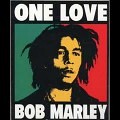
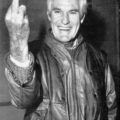
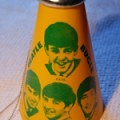

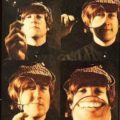
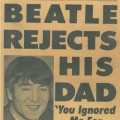
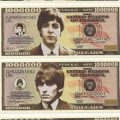

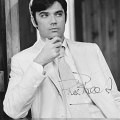
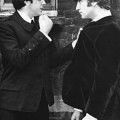
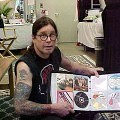

Mike, I was intrigued by something you mentioned in my Alma Cogan post — organized crime’s presence in the broader confluence of people/movements/things that made the Beatles story what it was. This is something I know next to nothing about, other than that I think it was connected to Seltaeb. Given our current political situation and my own interest in the Kennedys/Nixon/the Sixties, I was wondering what you were thinking of.
Okay, this is a big topic and one I’m too tired to discuss it fully right now, but in general terms:
.
Wherever you find showbiz, you find organized crime. Clubs, bars, dancehalls and other venues are and have always been great places for prostitution, gambling, drug sales, and money laundering; entertainers and criminals are endlessly in contact with each other. Managers, particularly, have to deal with all sorts of criminal types to book venues. So it’s 100% certain that The Beatles and Brian had at least a glancing acquaintance, and probably much more, with a who’s who of British and American gangsters.
.
Brian’s homosexuality and preference for rough trade gave him another vector of contact with the underworld…and tremendous personal vulnerability to blackmail, robbery and the like. So as soon as Brian’s act got big, criminal types would’ve likely swarmed in, to get their piece of the action. And Brian played ball, clearly he did — as a drug-addicted homosexual who was a compulsive gambler, Brian’s life from 1962-67 was one continuous “dog that didn’t bark.” Beatle writers usually assume that “Brian’s paper bag money” was for himself, or for the band, but that’s an assumption I don’t share.
.
Then there is another aspect going on as well. It seems that every Western capitalist society has a nexus of people at its top, brought together by their possession of money and power: top politicians, the very wealthy and any hereditary royalty is the part we acknowledge, and can see. To that you can add all the possessors of secret money and power: the armed forces, the intelligence services, and criminals. Showbiz people are often seen around this nexus — power likes glamor, and vice-versa. John Kennedy shared a girlfriend (Judith Exener) with a mobster (Sam Giancana) because they sometimes ran in the same social circles. And the reason we know this is because intelligence people were keeping tabs on all three, to secretly exert their own power and control.
.
The Beatles were not immune from this stuff, especially once they held, or could generate, incredible sums of money, some of it in cash. Wherever you find cash businesses, or skimmable businesses (like concerts) you’ll find organized crime.
.
Once one understands this reality, things like Princess Margaret’s late 1960s affair with a well-endowed gangster isn’t surprising — these people go to the same parties, know the same people, and have the same outsized appetite for risk. When you add in the peculiarly “egalitarian” ethos of the Sixties — to David Bailey, there seemed to be something terribly hip about including The Krays in a Box of Pin-Ups — organized crime involvement in the Beatles story is simply guaranteed. And the fact that nothing has ever been reported, not a whisper ever, is another dog that didn’t bark.
.
But it matters, or could matter, or might at least be an interesting thought experiment. One reading of Seltaeb was that Brian was a terrible businessman who got screwed. Another reading of it is that he was pressured into doing a terrible deal by (close friend and homosexual super-lawyer to the stars) David Jacobs designed to enrich god knows who, fronted by Nicky Byrne.
.
I am happier by far to concentrate on whether John and Paul ever actually “did the deed,” I think.
I’ve always wondered about the Beatles’ relationship with other acts they toured with. In the Eight Days a Week documentary, someone said they were wonderfully generous emotionally to their opening acts. But then recently I read an interview with Jackie DeShannon, who admitted there was a strict rule that opening acts were not allowed to speak to the Beatles, unless the Beatles initiated contact first.
As charming as the Beatles could be towards their hapless opening acts, I’m sure a pecking order was observed. I wonder though, if the roles were different when an opening act (or anyone sharing the bill) was King Curtis or Gene Vincent or Little Richard.
@Michael That’s a great synopsis, thank you. I wonder whether and to what extent anyone involved with or connected to the Beatles remained in contact with or otherwise connected by degrees to that world after the Sixties ended.
People in that line of work do not wear beauty queen sashes reading, “I am a criminal” ( unless you count our beloved President). You meet them, they are charming, they become your friends. They can get you coke if you want it. They can hook you up with a woman/women/man/men who will be discreet (because they also do not want publicity). Most importantly, they can provide a sense of excitement to you, after you’ve done everything and seen everything.
.
So yeah, I think that’s probably pretty likely.
Here’s one that has a slight possibility of veering into uncharted waters, but I’m brave enough to ask anyway. In a recent comments section, you said that Brian shut down any contact between The Beatles and The Process Church of the Final Judgment. Is this approach and rebuff documented? If so, where? I remember reading it a few times on the site, and was kind of surprised because I haven’t come across that anywhere.
I can’t recall whether I read that in the suppressed chapter to Ed Sanders book “the family”, or in the process church biography that was released about 10 years ago. The only other place I might’ve read it was a loopy website that posited intelligence agency activities centered around the Sunset Strip in the 60s.
Decided to track down that chapter of Ed Sanders’ book, and he refers in a single sentence, very generally, to the Fabs being approached. You sounded much more definitive about how abortive the attempt was, so my guess is it’s in one of the other two sources you mentioned.
Don’t be too sure of me in this instance; I may have been extrapolating from little data. I think it’s a sound extrapolation, though. The basis of my extrapolation was (I assume) that sentence, plus the timing, plus my knowledge of Brian’s life during 1966-67, plus the total lack of any Beatles connection at any time. Did The Process approach The Beatles? Surely — they were approaching popstars, and the payoff would’ve been tremendous. Were they rebuffed? Apparently. Did they ever get close to the group? Apparently not, even after Brian’s death.
.
The Process arrived in London in March 1966, establishing a commune in Mayfair (!). At that time, the Beatles Touring Machine was still in high gear, and Brian was still on the job, doing what he’d done since 1961. And thank goodness: Brian spent that entire summer dealing with the “bigger than Jesus” controversy. This made it precisely the wrong time to ask him, “Would the boys like to associate with a new religion with roots in Scientology?”
.
Brian may have also been involved in some pretty hinky stuff then, too — so anything that would’ve been likely to arouse the interest of Scotland Yard, MI-5, or Fleet Street would’ve rang immediate alarm bells. Never forget that Brian was a Jewish Northern homosexual drug-using casino habitué; he was comfortable and cultured, but not really part of the club. And his band weren’t part of the club, either. He couldn’t prevent the guys themselves from picking up a Process magazine, and John and Paul probably did, but as far as a formal intro, that wasn’t happening. If Joe Orton and “Up Against It” was too hot, the Process was never going to happen.
.
Did The Beatles know about them? Surely. Hip London in those years was a very small place, and Paul had his hand in a million pies. I am sure that if you pick up a copy of The International Times, there are ads for the Process, and/or a bunch of similar stuff. I bet Process magazines were racked at John Dunbar’s bookshop.
.
And yet that’s where it ended. Unlike The Stones, where Marianne Faithfull was reputed to be a Processean, and Jagger allowed his photo to be used on the cover of an issue, there’s never been a whisper of any Beatles connection to The Process, not then not now. The only thing I could find immediately was the assistant manager of the Apple Boutique, who joined The Process after being fired by John. (It’s kind of a funny story, you should read it.)
.
If there ever had been a Beatles connection to The Process, it would’ve been HUGE for that organization, just as it was HUGE for the Maharishi to have them attend a lecture, and then come to Bangor. When a Beatle got involved with a religion, as say George and ISKCON, it was a valuable public declaration. And later, if there had been any connection, it would’ve formed part of the “Helter Skelter” theory of the Tate/LaBianca murders.
.
To me the interesting question is: why wasn’t there a connection? Here’s my guess: George had picked his religion, and Paul and Ringo weren’t looking for one. So…John? Before August 1967, I think Brian would’ve warned him against it, and John would’ve listened to Brian. From August ’67 to April ’68, their dancecard had been filled by the ultimately benign Maharishi. Anyway, the Stones had claimed The Process, making them decidedly un-Beatle; and by the time John had begun taking calamitous advice from Mick, he had switched horses from TM to Yoko.
.
To be frank, with some few exceptions (Alex Mardas?), I think the Beatles had pretty good instincts for users and bad apples. Their inner circle screened them well, and Brian (and Peter Brown, and Derek Taylor, and Neil/Mal) have never gotten the credit they deserve for this; it was essential to the story. I think The Process — like Robert Fraser — set off Beatle alarm-bells. The Beatles and their circle were not middle-class LSE students from London; they were not Hampstead-born girls with links to Austrian nobility like Marianne Faithful; even John, Paul, George and Ringo knew that they were members of the Establishment only so long as they single-handedly fixed the UK’s trade deficit. A big part of being a Beatle was knowing your place (paging David Ormsby-Gore!) and that’s one of the reasons John came to hate it, and moved to America, where he was good as anyone and better than most.
.
As long as Brian was alive, there was a Gentlemen’s Agreement in place: The Beatles would be the “good rock group,” and in exchange they would be allowed to live the high life unmolested. In February 1967, Sgt. Pilcher came for The Stones and Fraser, not the Beatles — and it’s difficult not to see Brian in that protection. But there were limits to the Gentlemen’s Agreement, and the Beatles knew it. They were survivors, determined to survive — not just for the money and fame, but for the music, too. John would eventually risk it for Yoko, but they weren’t about to risk anything for The Process.
(I attempt to reply to comments, and it sends me to the bottom to start a new thread. Someone wake the engineer!)
It makes sense. I just wonder if John committed more of the Process philosophy to mind than we initially thought. Having read some of their early writings and compared them to John’s statements circa the peace campaign re: “We’re all Christ and we’re all Hitler.” Smacks of the Jesus/Lucifer reconciliation stuff the Processeans pushed.
There’s…an engineer?
.
Indeed that does sound like Processean stuff. But such ideas were pretty common at the time. If I were writing a generic 60s guru, he (and it would surely be a he, given the misogyny of the hippies) would endlessly say stuff like, “But, like, aren’t we ALL the Nazis, man?”
.
“I shouted out, “Who killed the Kennedys?”/After all, it was you and me.”
(Uh, no, Mick. No, it wasn’t.)
.
My only ping of interest in The Process has been a moment’s wonder (and this way lies madness) if they were some sort of CHAOS-like op. The background of both of the founders vaguely raises that unanswerable question.
.
The sixties more than most decades seems to show two “teams,” straight world vs. counterculture. But the reality was much more nuanced, and after 1965 or so, the counterculture is actually under attack and being actively infiltrated. Politics aside, the counterculture’s relationship towards capitalism made it (seem like) an existential threat.
The organizations/establishment discussions are pretty fascinating!
Perhaps this has been covered on this blog already, and I know it can get into subjective and esoteric territory, AND you might hate it, but I’ll throw it out there: I ‘d really like to see a discussion, book, whatever, that is not on tumblr, discussing the Beatles’ solo songs about/to each other or about Beatleness. I mean, we know “All Those Years Ago” or “When We Was Fab” and “Here Today” and “How Do You Sleep” and so on, but what about others? I’m not even talking about dream interpretations of poetical lyrics, but stuff that seems pretty upfront. I don’t see them discussed much in Beatle bios unless they’re the angry/bitter songs.
Well the first one that springs to mind is “Do You Want to Touch a Penis” (kidding kidding)
You mean like “You’ve Got to Hide Your Love Away”?
The first thing I thought of was Sympathy for the Devil’s last first (“just as every cop is a criminal…”). It’s interesting that the stones were permitted in the USSR before the Beatles.
*last verse
The Stones never represented any threat to authority, and repressive regimes know how to tell the difference.
Good evening and a happy new year!
I’m a new reader of this blog, so it’s hard to catch up, but I’m on it. I’m just reading Tune In for the first time, finding candid anecdotes about Paul and George, realizing that they really shared much more during their early years than I thought or seemed apparent during The Beatles and after that.
.
Maybe it has been discussed before (if so, can you redirect me there please?), I don’t know, but can I suggest as a topic for a post a more detailed analysis of the relationship between Paul and George? It seems to me that unlike Paul and John, the relationship between Paul and George languished and there was no going back for them. Perhaps on the Paul and John lovers thread something about George has been discussed, but that post is very long.
.
Thanks for your attention and willingness to maintain this blog.
Alejandra, I don’t think we have discussed the relationship between George and Paul a lot — but we have discussed George himself a lot, and you should search the site for those posts. If you don’t find much, holler and I’ll look.
.
I think you can intuit much from two facts:
.
One, on the road, Paul roomed with Ringo, and George roomed with John.
Two, after George’s trip to India in 1966, The Beatles seems to be George’s dayjob. That’s incomprehensible for either Lennon or McCartney.
.
The rooming arrangements were interesting because Ringo was apparently the one Beatle who always got along with all the others, and he was paired with Paul. Does that mean that Paul could be a bit hard to take? I suspect so, don’t you? Also, Paul was absolutely determined to demonstrate his equality with John, despite being younger. A Beatles where John and Ringo roomed together would have split very much along age lines in the early years; a Beatles where John and Paul roomed together would’ve really emphasized the “economy Beatles” feeling of Ringo and George.
.
So this arrangement was really the only way it could be; and it naturally led to John and George becoming close — him becoming John’s friend, more than Paul’s. Remember, George didn’t have the songwriting sessions that welded John and Paul together. In George’s eyes his friendship with John was a relationship of equals, but after the breakup John claimed it had been a sort of mentor-mentee relationship. I doubt that. It might’ve started that way in Hamburg, but by the mania period, I bet not. I think 70s John was being shitty, and feeling that George was catching up, ability-wise. You can argue that “While My Guitar Gently Weeps” or “Something” or “Here Comes the Sun” is as good as anything John did after 1967, and for someone who was already feeling crowded by Paul’s talent…
.
All these egos! You can understand why the group was uncomfortable for George, and you can understand why he found another interest basically ASAP. In the world of music, he found and idolized Dylan, who “saw him” in a way his fellow Beatles couldn’t; and in the world of everything else, he had Ravi Shankar and various gurus, none of whom knew or cared what John or Paul thought.
.
George and Paul are simply very different characters, with different styles, temperaments, interests and motivations; circumstance threw them together, but it’s clear that, as an adult, neither would’ve picked the other as a collaborator. Though he could’ve done other things, the career of a rockstar is the most perfect match for Paul McCartney as we know him. George, on the other hand, always chafed in that role, and of the four Beatles, is the one who actually had significant success in another field. There is something of the gentleman amateur about George. If Paul became more and more the driving force behind the “job” part of the Beatles after 1966, George would’ve naturally been antagonized by that.
.
George, like Ringo, is tremendously good at what he did in the group; but unlike Ringo, he was writing songs and playing the same instruments as John and Paul. So George both suffered by comparison (who wouldn’t?) and came in for criticism from John and Paul in a way that Ringo simply didn’t. This was terrible for George’s self-esteem and growth as musician, and I think it’s the root of his animus against Paul, who didn’t have the leeway provided by John and George’s friendship and similar temperament. John was a genius as a personality; Paul is a genius as a pop musician; George is not, and never wanted to be, a genius at either of those things. He ran to Dylan to put his fellow Beatles in their place, and to various Swamis (including Maharishi) to claim realms far beyond the twin fiefdoms of Lennon and McCartney.
.
George’s leap forward as a songwriter in 1968 and 69 made all this worse, not better. And so it also appears that a paranoid and drying up John used George as leverage against Paul in intergroup squabbles.
.
All so much to say that it’s a testament to George’s evenness of temper that he didn’t simply quit in 1966. And to Paul’s credit, Paul was adding a lot of great stuff to George’s songs, an act of generosity and friendship that doesn’t get enough play.
.
So were they friends? I think they probably were, just maybe not as much as we all wanted them to be, or hoped they would be, so after the millionth question, each one popped off in the press. In the end, they got very intimate — not simply out of sentimentality or fan service, but because they had played a huge role in each other’s lives, understood the pressures on each other, came from the same time and place, and…”brothers” is about right.
.
Sorry, I’m not writing well tonight. But maybe this helps?
This was a good synopsis Michael. And thanks to Alejandra for suggesting the topic. I too have been curious about George and Paul’s relationship.
I’ve watched several George interviews on You Tube, and George always says he loves Paul. I think they thought of each other as brothers, but as Michael points out, they were two very different people.
I’ve always been interested where John got his drugs from in 65/66, the whole LSD era. He was ensconced in Kenwood and did Brian provide those through his gangster contacts?
LSD doesn’t seems a gangstery type drug, but they provide the products that clients want I guess.
It boggles the mind what enabling was going on in that situation with no thought to the effects that would cause to John. Hangers on, wannabes, maybes, scammers. Hey Here’s John Lennon!! So very open, but vulnerable mind.
@Marlo, LSD wasn’t illegal in the US and UK until the fall of 1966, and so John wouldn’t have had any trouble getting it until after that point. Before then, scenesters like Michael Hollingshead would’ve been an easy source.
.
Famously, one of Apple’s first appearances was in the form of a film crew sent to Monterey Pop ostensibly to film the concert, but in fact tasked by John to fill empty lens cases with liquid Purple Owsley acid. (They couldn’t pull it off.) John eventually got his Owsley, though — according to Owsley’s Guardian obit, the famous drug maker supplied them around the time of Magical Mystery Tour. And this is all you need to know: giving the Beatles drugs is enough to make your obituary in 2011, think about what it could do for you in 1967!
.
But here’s something important to keep in mind about John and all the other Beatles during the Sixties: everybody wanted to be their friend. So they were constantly being offered drugs, sex, and whatever else by fans, friends, admirers and hangers-on, in hopes that this would create a valuable connection. Were some of those people criminals? Yes–but The Beatles didn’t have to resort to criminals for things like drugs.
.
If you want to know what they might’ve resorted to criminals for, think over the life and poor decisions of our dear beloved President Trump. Sexual peccadillos; squashing blackmail; and so forth.
.
The interesting thing about Lennon is that, prior to acid, his mind didn’t seem that vulnerable. He was, if anything, overguarded; but then acid hit, and (according to Goldman, who’s the only biographer who really addresses it) John became first happy-go-lucky, then rather sullen…but the keen judgment that gave him Paul, George and Ringo as bandmates, Brian as a manager, Neil and Mal as confidantes, and George Martin as a producer, that was replaced by a truly awful sense of friend and foe.
One thing I find sad is that the Lennon presented in popular culture, whether it’s the images accompanying articles, the predictable hagiography from his estate, or Internet hot takes, is the weakened, husk of John Lennon post-LSD, someone lazier, self-serious, hypocritical, and off-puttingly weird in a way that pre-1968 John, even with all his faults, was not. John Lennon in 1965 has done everything he set out to do and yet could do ANYthing next. John Lennon just six years later is the zoo animal he claimed he never wanted to become. He was still so young, he could have—had he wanted to—found his fire again, because it didn’t go out; it got redirected to measuring his waist with string and doing his most creative work in interviews.
Lennon talked a lot about martyrdom, and his legacy was surely on his mind for many years. But in surrounding himself with people who aided and abetted the awkward process of self-deification—by, as you say, losing his ability to tell friend from foe—he missed the opportunity to live long enough to see how much people loved him, to become one of the celebrated survivors like McCartney, Brian Wilson, or Bob Dylan whose off decades are now ignored and forgiven, and to cement his legacy through continued growth and change rather than an eleven year stage-managed sprint for gurudom. John, of course, did the best he could with what he had. But young John had the tools to do more still.
Replying to Michael above, re: Paul and George, I find it interesting regarding Paul and Ringo, because just earlier this week I was reading an interview with Paul in regards to their time in Austria (and the listening-to of Here, There and Everywhere) and Paul says that he usually roomed with George, but on that occasion he was with John. (Which is odd, because I thought Cynthia was there in Austria?) But anyway, another reporter (Bonis, maybe?) stated that Paul and John always roomed together. Maybe at that particular time Paul and George were the two unmarried men and thus they were lumped together; maybe that was the first nail in their friendship-coffin at that point. ;D
Well, color me totally confused then.
.
I highly doubt marital status had anything to do with such arrangements…unless, as you say, Cyn was on the trip. (“Nothing to see here, Cyn!”) But if she were on the trip, the only appropriate arrangement would be John rooming with Cynthia, not Ringo.
Hello, Michael. I was reading your replies and remembered that, not long ago, I read an interview with the Beatles’ U.S. tour manager where he said John and Paul roomed together, at least while in America.
It didn’t take very long for me to find it, so here it is:
Q – Did The Beatles get on each other’s nerves a lot? They were always so closely confined in their hotel rooms?
A – No. It was surprising. They always had a suite. George and Ringo stayed together in one room, and John and Paul in the other bedroom, and a big, big room in between. That’s an interesting point, because I was shocked that everything went so well, unlike The Stones and the scenes with Brian (Jones).
http://www.classicbands.com/BobBonisInterview.html
Wow, I wonder where I read the other, then. I would think that would really encourage George’s isolation.
I saw this question over at the SW blog and it made me curious:
——————————————-
What if the Beatles had recorded in America in 1966?
It’s well known that the Beatles were slated to fly to America and record an album at Stax Recording studio. They desperately wanted to reproduce that American sound they revered. It fell apart for several reasons including security and money.
But what if it did happen?
Would their next album be more roots based instead of the Revolver album? Songs like Tomorrow Never Knows couldn’t have been developed outside of the Abbey Road personnel.
Would a diversion from the London drug culture prevent it’s influences? Maybe no Sgt. Pepper?
What kind of band might have evolved from such an effort?
——————————————-
https://forums.stevehoffman.tv/threads/what-if-the-beatles-had-recorded-in-america-in-1966.920148/
That’s a really interesting idea. My first impulse is that — unlike the Stones — the Beatles would’ve felt confined by being white interpreters of black music.
.
The Beatles were not, as far as I know, blues-worshippers. Nor were they even huge Motown fans —- compare how much/often Paul talks about Brian Wilson, to how often he mentions, say, Diana Ross or Marvin Gaye, or The Temptations. Or the Stax artists—-I don’t think I’ve ever heard Lennon talk about Wilson Pickett or Otis Redding.
.
The thing to me about the Beatles’ psychedelic period is how it seemed to open them up to influences outside the American black context—-vaudeville, Indian stuff, Liverpool.
.
All that having been said, I would’ve loved to hear a Beatles album recorded at Stax…what do you think about all this, Sam?
All that having been said, I would’ve loved to hear a Beatles album recorded at Stax
The question fascinated me. The implication seemed to be it would have changed the entire course of their record history. But then I saw this reply, and it seems to be a more realistic scenario:
Maybe they would’ve dropped in long enough to record just a few songs, like the Stones later did in Muscle Shoals, and maybe something like “Doctor Robert,” “Got to Get You into My Life,” or “Good Day Sunshine” would’ve been a little more funky, or maybe it would’ve made little difference. Then, they still could’ve gone back home to work on the more psychedelic tracks.
It would have been fun to hear; an interesting sidetrack in their discography. And I agree with you re: Stones compared to Beatles. It reminds me of this quote by Frank Zappa on his experience arranging “The Other Side Of This Life” for Eric Burdon and the Animals:
“OK, so I had an experience arranging some stuff for them. And I found that not only were they not particularly original, but they were hung up in that R & B bag, which is deadening when you get little white boys trying to be little black boys, screaming the blues and being funky and all – that’s shitty.”
The original question mentions the Beatles becoming more “roots based” – but whose roots? As you say, their interests and influences expended far beyond anything Mick or Keith cared about.
And the REASON Mick and Keith and Brian didn’t care about that was, I’d guess, that black music was a way for them to escape their birth identity. And you can understand why: in England in 1950 they lived under austerity AND a rigid class structure.
.
But they never grew beyond the forms that they loved at 12—-they never did the authentic adult thing, which was take their own lives and contexts and make art out of that. Like say for example Pete Townsend. Which is why the stones, from an artistic standpoint, are much closer to Aerosmith than The Beatles. Like em or not, they are what Coca Cola is to food. And the same diminishment happened to Lennon whenever he’d disappear into one of his roots rock phases or even gurudom.
.
In fact, you could sum up classic rock as one big attempt by middle class white teenagers, waking up and seeing the injustices of the society they are inheriting, and using art to attempt to opt-out via a commercial process. And it’s not surprising that when McCartney began to fiddle with this process — draw on music that was authentic to him but didn’t perform this function – it was called “Granny music.” That’s why it was out of bounds; it wasn’t soothing racial and class anxieties, and threatened to unmask the whole thing as simply music and commerce.
.
Looked at in this light, Zappa should be careful where he casts aspersions; could someone not say Frank was a little American boy trying to be a little European boy? With all due respect to him, he was no more a classical composer than Keith’s a Delta blues man.
.
@Mike, I think the Beatles did go on the record (no pun intended) quite a bit, especially in the Sixties, about their love for black American music. Not only did their choice of covers make that clear, but they routinely emphasized their admiration for Smokey Robinson (John: the Beatles were always trying to be Smokey Robinson), Motown, etc. in interviews. And up until Rubber Soul, I can think of a fair number of Beatles originals that sound like they’re John Lennon writing girl group songs, processed through the John Lennon Pop Genius Filter: You’re Gonna Lose That Girl, Tell Me Why, You Can’t Do That, When I Get Home. Can’t Buy Me Love belongs in that category, too. Check out this list of the songs in John Lennon’s jukebox circa late 1965: http://chimeradave.blogspot.com/2012/11/the-almost-complete-list-of-45s-in-john.html.
Paul not talking about Motown as often as Brian Wilson, for example, probably says more about what, in retrospect, seems more likely to be a result of Paul having stories he can easily fall back on in interviews — just like there’s one John story, one George story, etc. that he defaults to. Brian Wilson is a sort-of friend with whom he had a famously competitive streak that yielded his masterpiece, Sgt Pepper. It’s an easy story to remember.
I agree, though, that the Beatles never responded to blues the way their South English contemporaries did. I suspect this is because the blues generally emphasizes instrumental skill and lyrics over melody and harmony. The early Beatles were more interested in the latter than the former. I’m sure that “Chains” or “Baby It’s You” found an easier route into their gifted young minds than “Moanin’ at Midnight” specifically because of the hooky melodies. Also, do we know whether the Beatles were even exposed to blues music in any substantive way before moving to London?
goddamnit I lost my original comment so quickly:
.
I was expecting someone to say this, and I’m glad you did. By 1966, the Beatles were moving away from their R&B influences, which were never Stax-focused. Even though they were unabashed fans of certain artists, they were, from the beginning, trying to do their own thing.
Also, do we know whether the Beatles were even exposed to blues music in any substantive way before moving to London?
I recall Lennon mentioning in an interview that he’d listened to Big Bill Broonzy in art school.
–Well the first one that springs to mind is “Do You Want to Touch a Penis” (kidding kidding) You mean like “You’ve Got to Hide Your Love Away”?–
Late reply to Michael, but mostly I was thinking of the post-Beatles callouts! Or remembrances.
However, now you mention Beatles songs, have you guys ever seen a mainstream analysis of John’s dispassionate glee in “Day in the Life” as relates to Tara Browne, who happened to be Paul’s friend, Paul’s upper-class arty friend, with whom he took acid and took to Liverpool for the holidays and who introduced Paul to acid when he’d refused to do it with John and the Beatles and whom Paul was with when he broke his face on a moped? Whenever it’s mentioned, Paul downplays the Tara aspect. I was reminded recently that RS did an article on Tara but didn’t make any emotional connections, like it’s just any old newspaper. (Here’s a link to the sort of fandom discussion I’ve seen: https://mcglassonion.tumblr.com/post/190383818781) What do you think?
I can see it as John’s nasty way of laughing at and forever immortalizing the death of a personal sort of rival. I know it’s one of those songs that’s been analyzed ad nauseam but I didn’t know if this analysis had gained any traction.
The tumblr blogger already lost me early on with her (?) asessment that “John openly disliked Tara”. Huh? There is no proof for that whatsoever, just two quotes from a friend and Tara’s wife that John probably wasn’t as keen on him as Paul was and generally might have disliked people with an upper class background.
If anything, the laughing at sad news ( the death of a young man they had known) in this song reminded me of John’s reaction to being told Stu had died.
I just read that post and it’s supremely internetty.
.
First of all, the RS piece is dismissed as “a puff piece,” when it’s actually several thousand words about Tara Browne; it’s the most in-depth discussion of the guy I’ve ever read (including book-length discussions of Swinging London like Shawn Levy’s “Ready Steady Go”). But the author dismisses it.
.
Second, the post writer characterizes Lennon as “laughing” at Browne’s death in “A Day In The Life.” There’s no laughing. Lennon does use the same flat, affectless vocal style that he used in “Strawberry Fields Forever,” but there’s no explicit emotional stance toward Tara Browne personally in that. If he had been singing like Little Richard, then switched styles only for that song, or that verse, you might be able to point to that as indicative of his emotional state, but in this case, not.
.
Then, it’s a roundup of facts cherry-picked and arranged to turn Paul and Tara into close confidantes. Maybe they were; but there’s only one person who can say that, Paul, and he doesn’t say that.
.
So: it’s
–scorn for actual reportage/journalism, and an assumption that the editors there have an explicit agenda which overrides everything else;
–assumption of a hidden “real story”;
–an argument kicked off by a factual error (“laughing”);
–an arrangement of facts designed to create a desired, yet unprovable, narrative. The LSD trip, the trip home to Liverpool, the motorcycle accident–all these are presented in service of a story that Paul was pulling away from John, John was enraged and hurt…because John was in love with Paul;
–and no corroboration from the only source who can really prove anything, which is Paul.
.
Though there’s no evidence to suggest this, John may have been in love with Paul, and he may have been furiously jealous over Paul’s friendship with Tara Browne. Though there’s no evidence to suggest this, he could’ve thought, “Paul is going to throw me over for some rich fella. Paul’s such a social-climber. Paul’s going to make a new group, and go off with his new friend, and I’ll be stuck here in Kenwood!”
.
That could’ve been what John thought. And John could’ve also thought, “So I’ll get one of Brian’s friends to cut Tara’s brakes. That’ll fix him.” And Brian, anxious to please John and keep the group together, wouldn’t have squawked.
.
The problem with this kind of thinking is that it’s not really about The Beatles. It’s about the thinker. So the person writing that post is a reasonably nice, non-ruthless person who has become convinced that the emotional currents between John and Paul is the single hidden key to the Beatles story. So he/she arranges the facts to suit. But he/she, not being ruthless, doesn’t go that (to me) obvious next step. Was Lennon jealous? Yes. Could he be murderous? Likely. Was he able to call on all sort of nefarious types? Likely.
.
But that doesn’t make either story *real*. And for the real thing that J/P illuminates, it casts shadows over a bunch of other real things. The J/P way of looking at The Beatles illuminates one small aspect of the story — the emotional ebb and flow of one friendship — while obscuring everything else.
Michael, I agree that looking through a narrow, predetermined lens ends up distorting the big picture, and this narrative about Lennon’s putative jealousy of Tara Brown seems to me to fall into that category.
.
I find it more plausible that, at some level, Lennon — and maybe all the Beatles, to some extent — were rather freaked out by Tara Browne’s death, in an “it might have been me” sense. I mean, I think of that anecdote of Lennon driving around while unknowingly under the influence of LSD, and of McCartney’s motorcycle accident. I’d characterize Lennon’s tone as dry and matter of fact when he sings “He blew his mind out in a car.” My own speculation (consume with whatever degree of salt you think fitting) is that singing about Browne’s death in the way he did was Lennon’s way of processing that death, with one eye on his own situation. “Nobody was really sure if he was in the House of Lords” is at one level a possible jibe at Browne and/or the public, and at another level a commentary on death’s leveling powers. Like, “will it matter that I was famous”?
Well put, @Nancy. What I thought of was the stories of George, Paul and John driving around London like maniacs. Do you remember where that was? Anthology? I remember them talking about close calls.
.
To be clear, I don’t think it’s bad to speculate; I think it’s unwise to be too sure. In part because certainty is an end to the discussion, and you lose contact with this great thing we all love. The mind craves certainty, but it’s the uncertainty that makes this subject so interesting.
Absolutely agree about acknowledging speculation, and interpretation, as such. There’s a lot we can’t know or can’t be sure of. It does seem to me a minor miracle that none of the Beatles suffered serious injury, given their vehicular escapades, some of which were probably done under the influence. Or even their non-vehicular ones: I remember when first watching “Help!” that I was amazed none of them ended up head first in a snowbank while shooting the skiing scenes. They all look high as kites, and super unstable on those skis!
Interesting! I see how the POV of the reader or who is looking for information can affect the outcome or decision — though I would really appreciate a lack of assumption that it’s J/P, because the piece doesn’t actually mention J/P (though I’m sure it’s sympathetic to that viewpoint!). It just states that it thinks the song has a root in John’s emotions and is not random.I don’t necessarily think there has to be a J/P shipping thing to think that John was jealous of Paul’s time and/or friendship, which is something I’ve seen explored in even mainstream bios.
I do think when they speak of a “laugh” they speak of the “I just had to laugh” line, not an actual physical laugh. Though I do laugh at the idea of John putting out the hit. There’s a fanfiction for you.
Thanks for your thoughts!
My pleasure, @Kristy.
.
My own experience is that if you assemble a large enough pile of data — on anything, really — a smart person can assemble that data to prove any number of things — especially if you keep things short. And we, as readers, have to decide, “Do we trust this analysis?” based on the clues towards bias.
.
I could give you three statements, inarguable facts, that would “prove” to you that JFK was killed by a conspiracy located in the CIA. (In fact, I could give you ONE fact.) But that one fact doesn’t make it so, and to really understand that event — not a complex friendship spanning decades, which would be vastly more nuanced — requires macerating ALL the data and coming to a conclusion that one holds pretty lightly. A lot of these “emotional” analyses of J/P are simply taking a few facts and creating a story that “feels right,” blowing them up to represent the whole picture, because that’s the picture the writer clearly wants. Fun? Sure. As substantial as an article in RS? No. History? Certainly not.
.
The author takes some facts and creates a narrative that John, jealous of Paul’s new rich friend, “laughs” mean-spiritedly at the death of his rival. Could be. But if you read the article, two things jump out:
Lennon said he wasn’t engaging in reportage: “‘I didn’t copy the accident. Tara didn’t “blow his mind out.” But it was in my mind when I was writing the verse,’ he told Beatles biographer Hunter Davies.”
Tara Browne was well-known for being a lousy, dangerous driver, and apparently didn’t think he would live very long. So his death in a car crash might well feel darkly comic: [I didn’t want to, I knew I shouldn’t, but] “I just had to laugh.”
.
J/P isn’t, to this heterosexual man, about whether John and Paul ever had sexual intercourse. It’s about a certain modeling of their internal emotional lives. And where I have a (tiny) beef with J/P is that they don’t acknowledge that this modeling very likely says much more about the people who dig J/P than John Lennon and Paul McCartney. Those two guys had emotional settings shaped by their time and place, not ours. The entire technique of using one’s own emotional life to interpret the Beatles’ story hinges on the writer being aware of his/her own biases, and that’s a pretty rare commodity on the internet.
.
So I would put this analysis in the same bucket as J/P, because it’s a writer taking his/her own contemporary mores and personal emotional style, and projecting it onto these two strangers from a very different time and place. To come to a conclusion that apparently does some emotional work for that writer. Were John and Paul a swirling maelstrom of emotions towards themselves, their lives, and each other? Undoubtedly. But we cannot know them, and we have to be content in that not-knowing.
.
Do I personally do this interpretive dance all the time? Sure. But I hope I cop to what my conclusion is doing for me, personally. And I hope I don’t present my thoughts quite so surely as this poster does. It’s the certainty, and the scorn for anyone who doesn’t “see” it, that makes me say it’s internetty. It makes me think about “A Day In The Life” differently for a second, and that’s fine. But it’s the…impatience? anger?…that’s the problem. It makes me think the writer isn’t talking about what’s really going on with them, but using this historical stuff as a shorthand. I’ve done it; it’s not a good place to be in the long-term.
And I wish I could edit my reply! Does one need an account to do that?
I would like to add, I wasn’t really looking for a takedown of the piece I shared, though that’s fine, because it’s there to be takend. I was kind of asking if that tack had been taken before– to quote myself, “have you guys ever seen a mainstream analysis of” — perhaps by a real live “not-internetty” source, for the thoughts it was putting across– i.e. that kind of interpretation of the song?
I wonder if, since I’ve already been outed and have painted myself with a J/P-friendly brush, however, am I always going to have to defend myself from being suspected of the J/P agenda?
Oh @Kristy, I hope it wasn’t a takedown. I focused on it, but not too unkindly I hope. If I seem sensitive to these issues, it’s because I spent over 30 years digging around trying to solve historical puzzles, and it’s a pastime that should be handled with care. It can be bad for people.
.
I think there hasn’t been a mainstream analysis of the relationship between Tara Browne, Paul and John, because there just aren’t a lot of statements from the guys about him. He is a relatively minor figure in the Beatles story. So unless Paul says, “Tara was one of my best friends,” or John says, “I despised Tara Browne,” there’s nothing hard enough for a journalist or an historian to dig at. There’s nothing to prove or disprove; that RS article is about the best anybody can do, using the tools of journalism/historiography.
.
You’re not “suspected of the J/P agenda” — the very idea makes me smile! J/P is just an idea that we’ve been talking about a lot, so I (perhaps wrongly) viewed the Tara Browne discussion via that lens. I think both of these issues, J/P and Tara Browne, are products of an internet-driven discussion. The internet is the idiom for Beatle fan-talk. Mostly for better, and occasionally for worse. But I’m delighted you commented — comment more!
An odd and haunting bit of trivia:
Suki Potier survived the famous car crash that killed Tara Browne.
And then she was killed in a car crash in 1981.
https://beatlequotes.wordpress.com/2019/10/04/he-blew-his-mind-out-in-a-car/
Hah, well, I say that about being suspected because honestly, expressing sympathy for the J/P viewpoint means exposing oneself a bit as being sympathetic to something that’s an object of derision and dismissal in all but a very few places. And while I find the subject fascinating (and admittedly it’s what drew me back to the Beatles) I do seek perspective. Thus my flurry of reading and search for canon sources! And nobody’s required to educate me, but I know there’s fifty years of fandom out there and I’d love to learn as much as I can. So when I see some little article of speculation that’s intriguing, I would just love to know if it’s old hat or new hat or PID-level stuff.
(I mean, I’ve found self-insert fanfiction with footnotes being sold as “history” for the Beatles. And I’ve read a lot of old threads here, including a great one on how the author thought Ziggy Stardust was about Paul. This is a wild and awesome bunch of fans, for sure.)
As for Tara Browne, I believe Paul said in MYFN that Browne was his particular friend. I know I read once in the distant past he was framed as “a friend of the Beatles” and thus I was surprised to see that different take in Paul’s book, and then I ran across that discussion of the song — which, from what I can tell, has been examined to death and back in Beatles literature and conferences and whatnot. I would be surprised to hear that was a new take, specious quality of the history or no. I thought myself the RS article was pretty informative.
I liked both — conventional journalism does the spadework and determines the facts, and then the analysis comes.
.
What I got from the tumblr was a reminder that Paul’s culture vulture nature was a source of tension with John. John and Paul had a fundamentally different attitude towards the British upper class. Though Tara Browne was an example of how talented people could mix freely with the aristocracy, the barriers still remained. John, George abd Ringo never forgot that, but I’m not sure that Paul didn’t think he couldn’t— like Mick — earn his way into the club.
PS keep forwarding interesting things!
Holy cow! I’m so glad to see Dullblog revived!
As for topics, Nancy, you never did write that post analyzing Rushes!
Hi Rose! So great to hear from you. You may just inspire me to write that post!